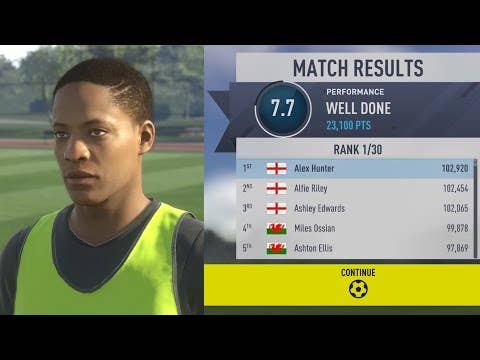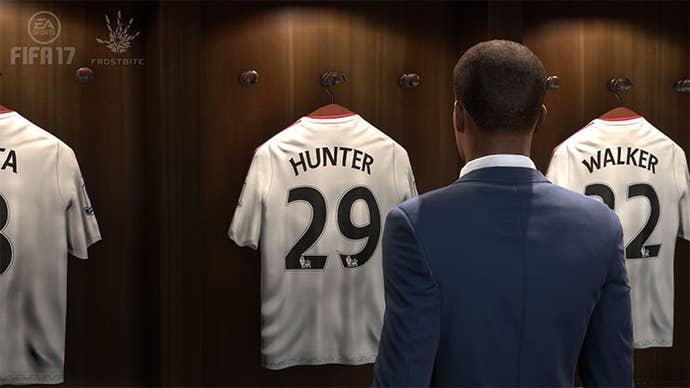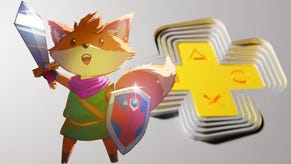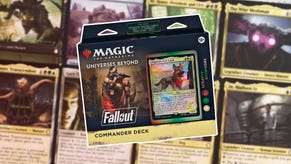The Making of FIFA 17's "The Journey" Story Mode
FIFA 17's creative director shares what made FIFA 17's story mode possible, why you can't play as a defender, and whether it's the future of the genre.
This article first appeared on USgamer, a partner publication of VG247. Some content, such as this article, has been migrated to VG247 for posterity after USgamer's closure - but it has not been edited or further vetted by the VG247 team.
USG: Can you tell me a little bit more about the systems around it, because you guys implemented a social media. What were you trying to accomplish with that?
Prior: Well, again, that’s kind of part of the footballer’s life right now. Social media’s a great example—it wasn’t even around not that long ago, but it’s such a big part, and a lot of footballers have got in trouble from posting things on there. So, it is a part of the footballing world, and for us it’s a great way of telling the story without the need for lengthy cinematics. You can see the fans reactions to you through that. So that’s a part of the footballers' world that they inevitably live with, so we wanted to bring that to the thing. And similarly, popularity is another big thing. So, we have, going back to the early point that we wanted an individual journey based on users. If we played through The Journey and met, our journeys could have been very different. You could have signed for West Ham, and I could have signed for City. I could have been loaned out quickly, you might not have done. And part of that is the personality of the players, so, if you see when you get an opportunity to interact with players, there’s three different choices, and that under the hood drives a personality system from kind of calm to fiery.
The interaction with other characters who you meet on the journey will be changed based on that, as will your popularity with the fans. So, the idea is that you can be the fiery—I always use Mario Balotelli as an example because I’m a City fan—and when he was on our team he was kind of a crazy, larger than life personality, and as long as he was playing well, people absolutely loved him. And they loved him that extra mile because he’s this crazy guy. So in a similar vein, if you’re the big crazy fiery guy, fans will love that and your popularity will grow. But the manager might not favor you as much as he would if you were the calm guy, because no one wants to deal with a hundred big egos. So, you can choose to be the fiery guy, and that will drive your popularity, which in turn will drive your endorsement opportunities, so the deals. Conversely, if you’re the calm guy, you’ll get more time on the pitch, but you won’t be as popular. So the journey varies based on how you answer the questions, and we want that to come across. Yes, we give you Alex Hunter, but you can make him your Alex Hunter in many respects.
USG: It occurs to me your follower count also serves as a metric for how you’ve progressed. How much you’ve grown. “I’m up to a million followers!”
Prior: Yes, absolutely, and that will be based on your performance. If you get a two out of town match rate, you might get followers leaving, whereas if you get a ten out of ten match, and it’s true in the real world, right? If some youth kid signs to Man City and then just kills it game after game after game, people are going to flock to him on social media.
EA representative: Like Marcus Rashford.
Prior: Exactly. And we met Marcus Rashford. I’m a Man City fan, and as you know, there’s a bit of friction, but he was a really nice guy, actually, and he’s one of the guys we went to. It’s one of those weird things of life imitating art, because we didn’t really think the Marcus Rashford story by any stretch when we were coming up with it, but, we started two years ago, when he wasn’t really on the radar. And it’s interesting to see his rise almost mirror the story our guy goes on. He’s like, "Oh yes, this is kind of like my story." That was not intentional, it just kind of happened, which is interesting.

USG: In terms of the gameplay, how well did the soccer ultimately mesh with the structure of the story?
Prior: Yeah, and that’s the thing. That’s why in the game we’ve offered the ability to play locked as Hunter or play as the whole team. But all of it is about Hunter. So the rating you get in the top corner is all relating to Hunter. So, even if you’re not playing locked to him, what you’ll find is users will try to funnel everything through him. So I think he gelled naturally with the world of football. Obviously, you’re not necessarily involved as much as you are in hockey or in basketball where it’s five on five close quarters, so we had to think about that when we were coming up with the game, hence why we offered the opportunity to play unlocked. But when you’re playing locked you’ve got call for ball and all the rest of it, so you can kind of passively interact with the rest of the team. So yeah, it gelled nicely, and with the advancements we’ve done with the man of the match system, giving that constant feedback. That was important.
The other part, the gameplay side of things that lent itself really well to story mode, were the skill games. Because the life of a footballer is game practice, we could have that as part of the narrative, and users go through training and they learn the game too. Even advanced users learn a lot of buttons and functionality that they don’t know because they get to a certain level of competency, and they’re like alright, I know how to play. There’s a lot of functionality in our game that even advanced users don’t know, and by virtue of putting users through skill games, they’ll often discover more. So it showcases not only the culture of football but how to play the game, and everyone who plays through The Journey is likely to come out the other side a better player, because the amount of experienced stuff that they’ve not actively sought out.
USG: Yeah, that was one thing that I was observing was, you guys have had the skill games for a while now. You finally implemented them seamlessly, it’s not just something that you’re playing as a loading screen.
Prior: Absolutely, and we know that people take the trouble to go out and play that stick around longer, because fundamentally they understand more about the game, and then enjoy it more and obviously appreciate it more. But there was only a very small subset of people who would actively go to the skill game menu. Obviously, you’ve got the one going into the game, but that’s just a quick snapshot. So one of the great things about The Journey is it offered us the opportunity to integrate learning the game into the core loop so it doesn’t feel like you’re wasting your time. You will get that as part of the core loop, so that’s another fundamental thing about The Journey is that we wanted it to be basic training for FIFA. You come out the other side in a safe environment. You’re not getting hammered by a guy 20-0 online. You come out the other side appreciating our game more and appreciating football more.
USG: But you can’t be a defender. You can’t be a fullback. This was obviously a very deliberate decision by you guys. Why?
Prior: There are two reasons, really. One, the story of a defender and what a defender would have to do to achieve notoriety in the world of football is a very different kind of story than a attacking player. So, consequently, you draw that line, and you almost need two stories at that point, and obviously we didn’t want to dilute it and put effort into two. We wanted to make the most compelling story. The other side of things is that we see from the telemetry who picks what decision, and a very small subset of users pick the defensive positions. So we wanted to create the most compelling and immersive story, and we felt that is more along the lines of the attacking players. The glory seekers, right? Much as we would like—even a goalkeeper story would be a great story to do—we need to pick and choose our battles, so that’s kind of where that came from.

USG: Do you think that going forward, story mode is going to become a standard feature in sports games?
Prior: In sports games, yeah. Like I said, there’s an appetite for that thing because they offer a window into all sports like never before, and people like that. So I think it’s a possibility. I think there’s an interest in stories to tell in most sports. Sports games will get there, I don’t know, we can’t really talk about the future. But absolutely, there’s an appetite for that from the fans.
USG: There's a remendous amount of resources, tremendous amount of work that goes into this stuff. You just look at NBA 2K—they do a different one every single year. They’re having to constantly try new stuff. But at the same time, it makes it a lot less dry, right? It’s a lot more engaging. It goes from spreadsheet to a movie. That’s compelling.
Prior: Yeah, absolutely, and that’s part of the reason behind the desire to bring a story to the world of football. It’s something users have never seen before, an emotional investment like never before. You can go on and play with your heroes, your team, the Man Cities, et cetera et cetera, and take that to a certain level involvement, but story allows us to really care about a character like never before. So like I say, all the feedback thus far has been hugely positive in that respect.








